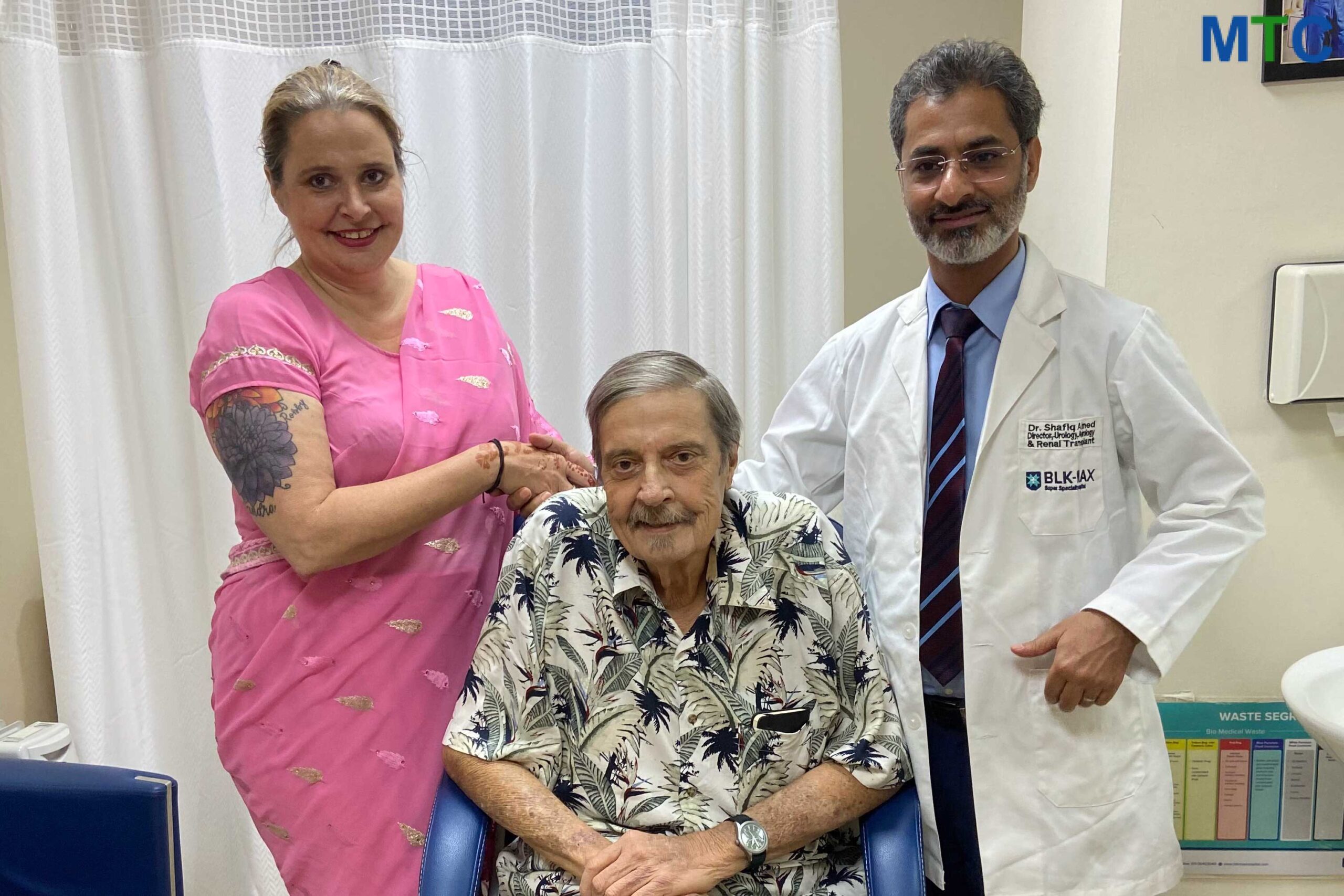Kidney Transplant in India: Cost, Hospital, Success Rate & Donor Details (Complete Guide)
Here is our easy guide on kidney transplant in India.
Know the cost, success rate, procedure, and donor information for international patients.
Contact us to find the right kidney transplant program for you.
Cost of Kidney Transplant in India
The cost of a kidney transplant in India is USD$13,000 for a compatible blood group donor. If the blood group of the donor and recipient is different, the cost is USD$24,000 due to extra treatments needed.
Read more in the Procedure section.
The cost of kidney transplant in the US is over USD$400,000[1]
| Treatment | Cost in India | Cost in the US |
| Kidney Transplant | $13000 - $24000 | $442,500 |
*Cost can be subject to cases
According to Statista, over USD$150,000 goes into just surgery and hospitalization in the US.[2]
Procuring Kidney from a donor registry is also an added cost. This may not be incurred by patients who have a relative acting as a donor.
Here is a snapshot of the cost breakup:
| Parts of treatment | Cost in USD |
| Hospital transplant surgery | $152,300 |
| Procurement | $113,900 |
| Post-transplant follow-up tests | $85,500 |
| Pre-transplant tests | $32,700 |
| Medication | $31,900 |
| Physician | $26,200 |
| Total | $442,500 |
Package Cost and Timelines
Find out what is included and excluded in our package cost, ranging from USD $13000 to $24000.
| Person | Number of Days | Includes | Excludes |
| Patient | 8 |
|
|
| Donor | 3 |
How Long Does It Take for International Patients To Get Kidney Transplant in India?
It takes 6-8 weeks for international patients to get a kidney transplant in India.
Here is the treatment timeline with cost inclusions and exclusions.
| Phase | Treatment | Patient Duration | Donor Duration | Cost included or excluded |
| Total Stay | End-to-End | 8 Weeks | 6 Weeks | |
| Initial Part |
|
3- 4 Weeks | 3-4 Weeks | Excluded |
| Main treatment |
|
8 Days | 3 Days | Included |
| Last Part |
|
4 Weeks | 2 Weeks | Excluded |
*Duration is subject to change depending on the patient or donor health
Here is how foreigners can get kidney transplant treatment in India.
Affordable and safe kidney transplant now possible!
Find the best kidney transplant program today
How International Patients Can Get a Kidney Transplant in India: Complete Procedure

A large number of foreigners are resorting to India to get a kidney transplant.
The kidney transplant program in India is the second largest after the US.[3]
Once the international patient connects with our medical advisors, they are asked to share all the initial medical reports. Many times with kidney failure comes several other complications, such as heart disease or anemia.[4]
This is why our advisors require all records of the patient, to find them the best hospital in India for a kidney transplant.
Patients are connected to the hospital, where doctors assess the donor's eligibility.
Who can be a donor?
For foreigners in India, only 1st-degree relatives can be kidney donors.
Who are 1st-degree relatives?
- Mother
- Father
- Siblings
- Spouse
- Children
2nd-degree relatives cannot donate their kidneys to overseas patients.
Know more about the law in India.
Legalities for Kidney Transplant in India
In India, the Transplantation of Human Organs Act passed in 1994[5] has made rules stringent for international patients to get a kidney in India from a living or deceased source.
International patients need to get their own 1st-degree relative to be a donor.
Before Procedure: Tests to Identify Donor Compatibility
There are multiple tests required to prepare for a kidney transplant.
Here are the tests which determine whether the donor is compatible or not.
Each person has a different blood group. Some blood types are compatible only with specific other types.[6]
| Donors blood type | Recipient blood type |
| O | O, A, B or AB |
| A | A or AB |
| B | B or AB |
| AB | AB |
Previously, incompatible blood tests often led to donor rejection due to fear of transplant failure.
Now, India's leading hospitals use advanced treatments such as immunosuppressant therapy that allows incompatible kidney transplants.
These treatments are expensive and increase the overall cost of incompatible kidney transplants.
The doctor mixes the blood of the donor and recipient, assessing it for antibody reactions. If the recipient's antibodies attack the donor's, compatibility is difficult, making the kidney incompatible.
Tissue Typing is also called the HLA test. Each individual has a different HLA gene, except for twins. Doctors conduct this test on the donor and recipient.
The closer the match, the better the chances of the kidney successfully being accepted by the recipient.
Main Procedure: How Is the Surgery Performed?
Kidney transplant surgery can be done in different ways:
- Open Surgery: The surgeon operates in a conventional fashion.
- Laparoscopic Surgery: The surgeon operates using a laparoscope more effectively.
- Robotic-Assisted Laparoscopy: The Surgeon operates on the patient remotely assisted by a robot.
90% of kidney transplant operations are done through Laparoscopic surgery. In case the patient is younger & healthier, doctors recommend robotic-assisted laparoscopy.
The Transplant Team
Kidney Transplant requires a multidisciplinary approach with a number of specialists involved.
The treatment requires:
- Transplant Surgeon: Performs the operation.
- Nephrologist: Specializes in kidney transplant and manages the entire process.
- Cardiac team: Monitors the heart before, during, and after the surgery.
- Anesthesiologist: Administers anesthesia and observes levels throughout the surgery.
- Support staff.
The treatment would involve other specialists if needed.
After Procedure: Follow-up and Diet
The patient requires follow-up after surgery due to strong immunosuppressants, weakening the immune system.
It is vital for the patient to rest, take prescribed medication, and maintain a nutritious diet for recovery.
What should the patient eat post-Kidney transplant surgery?
With weakened immune systems, a low sodium, vitamin-rich, high-fiber and lean protein diet is crucial.[7]
Patients should minimize sugar, junk, salt intake, and fatty foods in order to maintain weight and prevent cardiac or blood pressure issues.
Success Story of International Patient
Watch how Earl Sorrells, a patient from the US, came to India for a kidney transplant when all hope was lost in his home country.
Thanks to the smooth facilitation by the advisors and the treatment plan designed by the doctors in India, Mr. Sorrells' surgery was completed ahead of schedule. He left the country happy and healthy.
Success Rate of Kidney Transplant in India
Survival Rate of kidney transplant in India is 98.7%.[8] In a study from the Southern part of India, published in the Journal of Association of Physicians in India, it was seen that patient survival was 98.7% at 3 years and 76.8% at 5 years with a 95% confidence index.
Best Hospital for Kidney Transplant Program in India

- Best transplant surgeon with over 18 years of experience in neurology, transplant and robotic surgery.
- One of the best success rates in Kidney Transplant in the world.
- Highly equipped with Laparoscopic and Robotic Surgery for transplant.
- Advanced technology such as Lamellar Airflow in the ICU help to minimise post-operative infections.
- Performed successful kidney transplants in HIV Positive patients
- Performed Successful ABO incompatibility kidney transplants
Best Surgeon for Kidney Transplant in India

Dr. Shafiq Ahmed
16
DNB (Urology)
Expertise
Urology
Education
CMC Medical College & Hospital, Ludhiana, India.
- 18+ years of experience in neurology and transplant surgery
- US credentialed robotic uro-oncologist
- Key member in setting up Renal Transplant Programme in top hospitals in India
Overview: Kidney Failure and the Need for Transplant
Kidneys filter waste and maintain blood pressure in the human body. Diseases like diabetes, obesity, or heart conditions can lead to kidney failure. When kidneys fail, they cannot properly remove waste, leading to serious health issues or even death.
Treating Kidney Failure: Dialysis and Transplant
When kidney function declines to about 85-90%, symptoms like blood in urine, vomiting, and fatigue emerge, signaling the need for immediate treatment.[9]
Dialysis, which mimics kidney function, is the initial treatment that doctors recommend, which can sustain patients for a long time. If dialysis does not work and kidney function further deteriorates, a kidney transplant becomes an essential consideration.
A 2021 study by NCBI found that dialysis in the US costs over USD$98,000 per person.[10] Considering the expense and discomfort, doctors often suggest kidney transplant as the ideal treatment for kidney failure.
Type of Kidney Transplant Donors
Kidneys can come from 2 types of donors:
Deceased donor: A deceased donor is a donor who would have died of brain or cardiac arrest (preferably) and whose organ is used for the recipient.
Living donor: A living donor is a living person who can donate an organ. This is usually a relative.
What Are Risks Associated With Kidney Transplant
Be aware of the risks associated with Kidney Transplant:
- Infections: Studies show 10-20% of patients require antibiotics within the first week of a transplant. The patient is put on immunosuppressants, which weaken the body and expose it to the risk of infections.[11]
- Rejection: Possible due to blood clots or early kidney disease recurrence.
- Cardiac issues: Risk of heart attack due to blood supply blockage.
- Delayed graft function: A new kidney may take time to function properly, especially from deceased donors.
Is Kidney Transplant in India Safe?
Yes, Kidney Transplants can be safe in India, as per studies, with proper preparation, recipient screening before surgery, and multi-disciplinary inputs.[12]
Conclusion
Get a cost-friendly kidney transplant in India today.
Say goodbye to kidney problems! Discover success rate, procedure, and donor details.
We connect you to the best hospital and certified surgeons. Act now for a healthier tomorrow!
FAQ
Yes, US citizens can get a Kidney transplant in India. Reach our medical advisors for all information through the Contact Us button on the page.
Visit New Delhi, the capital of India, to find the best hospital, BLK Max Super Speciality, for a Kidney Transplant Program.
Reference
- National Library of Medicine Global Perspective on Kidney Transplantation: United States
- Statista Average amount charged for a kidney transplant in the U.S. as of 2020, by category
- Indian Journal of Urology Current trends in kidney transplantation in India
- American Kidney Fund Health problems caused by kidney disease
- Indian Journal of Transplantation Legal Aspects of Transplantation in India
- National Kidney Registry What Tests Do Kidney Donors Have to Take Before Transplant?
- National Kidney Foundation Diet and Transplantation
- Journal of the Association of the Physicians in India Demographic Characteristics, Outcome and Complications of Renal Transplantations at a Tertiary Care Center in South India
- National Kidney Foundation Choosing A Treatment For Kidney Failure
- National Library of Medicine Dialysis and Total Health Care Costs in the United States and Worldwide: The Financial Impact of a Single-Payer Dominant System in the US
- NHS Blood and Transplant Early risks of a kidney transplant
- Transplantation Is it Safe to Be Transplanted From Living Donors Who Recovered From COVID-19? Experience of 31 Kidney Transplants in a Multicenter Cohort Study From India
